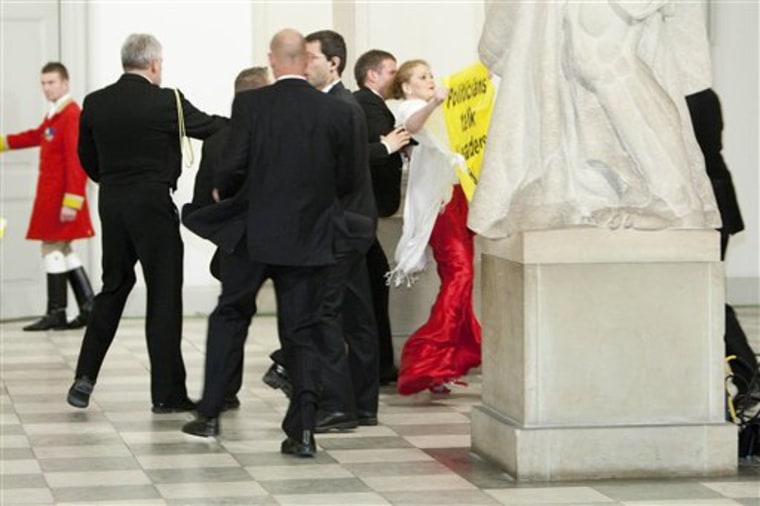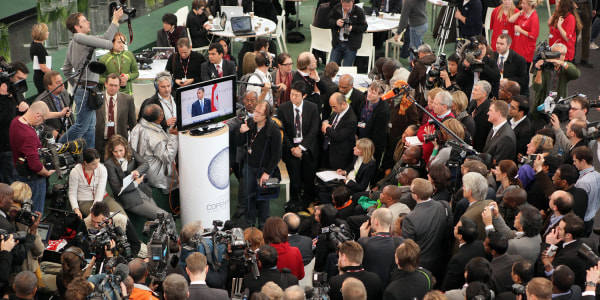Large pieces of a climate deal fell into place Thursday with new offers from the U.S. and China, but other tough issues remained before President Barack Obama and other leaders can sign off on a political accord Friday.
An announcement by Secretary of State Hillary Rodham Clinton that the United States would contribute to a climate change fund amounting to $100 billion a year by 2020 was quickly followed by an offer from China to open its books on carbon emissions to international review.
The U.S. delegation did not immediately react to the offer by Vice Foreign Minister He Yafei. But it went a long way toward the U.S. demand that China report on its actions to limit the growth of Beijing's carbon emissions and allow experts to go over its data.
The sudden concessions on the eve of Friday's final session lifted hopes that the 193-nation conference could reach a framework agreement that could be refined into a legal accord next year on limiting greenhouse gas emissions and fighting climate change.
Obama and Chinese Premier Wen Jiabao were to join more than 110 world leaders for the last scheduled day of the conference, which for most of its two weeks was embroiled in angry exchanges, a partial boycott by African countries and another entire day wasted in procedural wrangling. It's also possible that once the world leaders depart, the talks could continue at the ministerial level and stretch late into the night and early Saturday.
A pair of Greenpeace activists crashed a Thursday night banquet hosted by Denmark's Queen Margrethe for the world leaders already in town. The couple, dressed in formal wear, unfurled two banners reading "Politicians Talk, Leaders Act" as they walked on the red carpet reception line, and were dragged from the hall by security guards.
Late-night talks
Clinton, British Prime Minister Gordon Brown, French President Nicolas Sarkozy, German Chancellor Angela Merkel and about two dozen other leaders returned to work from the banquet to forge a political declaration, and were expected to meet into the early hours of Friday.
They were seeking to include a range of emissions targets for rich and developing nations, and outline financial commitments, said several European diplomats who spoke on condition of anonymity because the agreement has not been finalized. It also may set deadlines for reaching a legal binding climate pact by the next U.N. conference in Mexico City in November 2010, they said.
The conference seems likely to fall short of the goal set by many developing countries for a deal that would be legally binding on all parties and guarantee the kind of dramatic emissions reductions by the industrial world that threatened nations feel are necessary.
Clinton's announcement on funding was widely welcomed. Yoshiko Kijima, a senior Japanese negotiator, said it sent a strong signal by Obama "that he will persuade his own people that we need to show something to developing countries. ... I really respect that."
Swedish Environment Minister Andreas Carlgren said Clinton added "political momentum," and India's Environment Minister Jairam Ramesh called it "a good step forward."
Independent agencies also praised the move. "I think we're closer now than we have been in two years," said Tom Brookes, an analyst for the European Climate Foundation.
"It shows that when the U.S. moves, China moves," said Kim Carstensen, the climate director for the World Wildlife Fund.
The White House was lowering expectations ahead of Obama's trip.
"Coming back with an empty agreement would be far worse than coming back empty-handed," presidential spokesman Robert Gibbs said.
Neither the U.S. nor China raised its commitment on emissions. Clinton repeated the U.S. would cut emissions by 17 percent from 2005 levels by 2020, and China said its voluntary emissions target was nonnegotiable. It announced last month it would cut its "carbon intensity," or the amount of emissions in relation to production, by 40 to 45 percent.
An internal calculation by the United Nations, obtained by The Associated Press, said pledges made so far by both industrial and developing countries would mean a 3-degree Celsius (4.8-degree Fahrenheit) temperature rise. A panel of U.N. scientists has said that any rise above 2 degrees C (3.6-degree F) could lead to a catastrophic sea level rise threatening islands and coastal cities, kill off many species of animals and plants, and alter the agricultural economies of many countries.
But the U.S.-China moves could prompt the European Union to raise its emissions commitment to a 30 percent reduction by 2020 from 1990 levels, and similarly inspire Japan and Australia to lock into the upper end of their previously announced targets — 25 percent each.
Aid contingent on 'transparency'
Clinton said the U.S. agreement to the annual transfer of $100 billion to developing countries was contingent on reaching a broader agreement that covers the "transparency" of China's measures to limit heat-trapping gases.
"We think this agreement has interlocking pieces, all of which must go together," Clinton said, accusing China of backsliding on deals reached in closed meetings earlier this year. "It would be hard to imagine, speaking for the United States, that there could be the level of financial commitment that I have just announced in the absence of transparency from the second-biggest emitter — and now I guess the first-biggest emitter."
Slideshow 63 photos
Taking aim at global warming
He, the Chinese official who spoke in the same press room a few hours later, said Beijing had no legal obligation to verify its emissions actions, but was not afraid of supervision or responsibility.
"We will enhance and improve our national communication" to the U.N. on its emissions, He said. China also was willing to provide explanations and clarification on its reports.
"The purpose is to improve transparency," He said, adding that Beijing was ready to take part in "dialogue and cooperation that is not intrusive and doesn't infringe on China's sovereignty."
Expert studies, by the World Bank and others, have estimated the long-term climate costs for poorer nations, from 2020 or so, would likely total hundreds of billions of dollars a year. China and some other developing countries say the target should be in the range of $350 billion.
Although the initial Chinese reaction to Clinton's announcement was somewhat positive, a leading Bangladeshi delegate felt otherwise. "This is inadequate," said Quamrul Islam Chowdhury. "We are looking for around $600 billion."
In addition, the developing nations want long-term financial support based on stable revenue sources, such as a global aviation tax that might be the goal of future international climate talks.
Yvo de Boer, U.N. climate chief, said talks would focus on the "adequacy" of the $100 billion cited by the U.S.
Moreover, any overall climate deal will have to be agreed by unanimity. And some small island states and African nations — vulnerable to droughts, floods, heat waves and rising seas — insist they will not agree to a weak deal.
"We are talking about the survival of our nation," said Prime Minister Apisai Ielemia of the Pacific island state of Tuvalu.
Negotiating committees worked through the day and were expected to continue late into the night on an agreement.
Yet to be decided was how the huge sums of money flowing from rich to poor countries would be handled, and whether a new multinational body should be created to distribute the funds. Dessima Williams of Grenada, who chairs an alliance of small island states, said Obama telephoned her prime minister Wednesday to discuss the governance of the bulging climate fund.
The White House officials said the biggest sticking point in the talks was the form of the final accord, and whether it will be legally binding on everyone.
Developing countries insist the 1997 Kyoto climate treaty be renewed and extended while a new pact is drawn up to include the U.S. and others. The U.S. does not want its emissions targets to be binding in an international treaty.
U.S. lawmakers want controls
China and other developing nations were not required to reduce emissions under Kyoto or file regular greenhouse-gas "inventories." Now that they have pledged voluntary controls, the United States wants their emissions actions to be "measurable, reportable and verifiable."
The issue is particularly sensitive in the U.S. Congress, where members want to ensure China is living up to its own internal commitments.
"It's essential for the global effort, but their internal efforts as well," House Speaker Nancy Pelosi told reporters in Copenhagen.
U.S. Sen. John Kerry, D-Mass., said he had discussed the issue with Chinese officials Wednesday and progress was being made. Conference observer Jake Schmidt, of the New York-based Natural Resources Defense Council, suggested the Chinese might satisfy their critics by submitting yearly reports, with more detail.
Meantime, the U.S. came under renewed pressure to improve its pledge of greenhouse-gas emission cutbacks — by about 17 percent by 2020, compared with 2005 figures. That's only a 3 percent to 4 percent reduction from 1990, the benchmark year for the Kyoto countries and the basis for the EU's pledge to cut emissions by at least 20 percent by 2020.
"I have to be honest, an offer by the United States to cut only 4 percent from 1990 levels is not ambitious enough," German Chancellor Angela Merkel told lawmakers in Berlin before arriving in Copenhagen.
One expert analysis of industrialized countries' current pledges on emissions in 2020 find that in aggregate they amount to 8 percent to 12 percent below 1990 levels, far below the 25 percent to 40 percent recommended by the Intergovernmental Panel on Climate Change, the U.N. scientific network.

